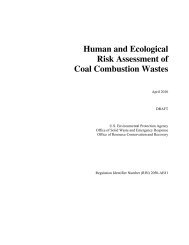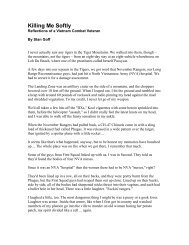Analysis - The Institute for Southern Studies
Analysis - The Institute for Southern Studies
Analysis - The Institute for Southern Studies
Create successful ePaper yourself
Turn your PDF publications into a flip-book with our unique Google optimized e-Paper software.
Bevill Amendments 10 which exempted “special wastes” from regulation under Subtitle C of RCRA until further study and assessment of risk<br />
could be per<strong>for</strong>med:<br />
1980 Bentsen Amendment (RCRA 3001(b)(2)(A)): Exempted drilling fluids, produced waters, and other wastes associated with the<br />
exploration, development, and production of crude oil or natural gas or geothermal energy.<br />
1980 Bevill Amendment (RCRA 3001(b)(3)(A)(i-iii)): Exempted fossil fuel combustion waste; waste from the extraction, beneficiation,<br />
and processing of ores and minerals (including phosphate rock and overburden from uranium ore mining); and cement kiln dust.<br />
<strong>The</strong> Bevill and Bentsen Amendments required EPA to complete full assessments of each exempted waste and submit a <strong>for</strong>mal report to<br />
Congress on its findings. As itemized in Appendix A to this RIA, since 1978, EPA continued to evaluate CCR (as well as the other five waste<br />
categories) <strong>for</strong> different possible RCRA hazardous and non-hazardous waste regulatory approaches. <strong>The</strong> proposed RCRA regulation this RIA<br />
supports is a continuation of those prior evaluations.<br />
1C. EPA’s Proposed Regulation of CCR Disposal Will Correct Market Failure<br />
OMB’s 2003 Circular A-4 “Regulatory <strong>Analysis</strong>” guidance (pages 4 to 5) to Federal agencies <strong>for</strong> implementation of Executive Order 12866<br />
identifies three major types of market failure:<br />
1. Externality, common property resource, and public good<br />
2. Market power (i.e., lack of market competition from monopolies)<br />
3. Inadequate or asymmetric in<strong>for</strong>mation<br />
<strong>The</strong> CCR proposed rule which this RIA supports may be characterized as addressing the “negative externality” of environmental pollution and<br />
damages from CCR disposal landfills and impoundments. As summarized in the “Benefits” Chapter 5 of this RIA, there are a number of<br />
historical and recent environmental damage cases which represent externalities, in that some or all of the (a) human health damages (i.e.,<br />
human cancer cases from contaminated groundwater near CCR disposal sites) and (b) environmental damages (i.e., ecological damages, natural<br />
resource damages, and socio-economic damages from CCR spills/releases from structural failures in CCR disposal impoundments) may be<br />
external to the capital and operating costs of the electric utility plants. If implemented, the CCR proposed rule may be expected to reduce this<br />
market failure externality, by internalizing into the capital and operating costs of the electric utility plants, the added costs of installing<br />
engineering controls and oversight of the physical integrity of CCR disposal units.<br />
Firms are sometimes held accountable <strong>for</strong> some of the external costs through lawsuits brought by affected citizens. However, the system of<br />
accountability can be imperfect. <strong>The</strong> primary human bearers of the external costs from CCR disposal are households residing disposal units.<br />
When an unorganized group of households suffer external costs, they face a host of obstacles to having their costs recuperated. <strong>The</strong>y must<br />
10 <strong>The</strong>se 1980 RCRA “special waste” amendments are named after US Senator Lloyd Bentsen (D-TX; Senate service years 1971-1993) and US House Congressman Tom<br />
Bevill (D-AL; House service years 1967-1997). Source: Biographical Directory of the US Congress at http://bioguide.congress.gov/biosearch/biosearch.asp<br />
15




